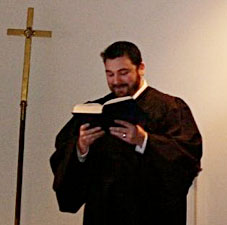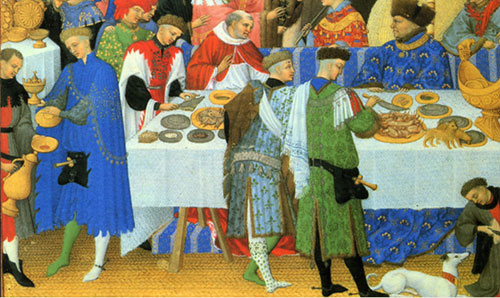Time to Party – 1
“…how we feast and celebrate is a reflection of our beliefs concerning the salvation of the world.”
Sermon Notes on Deuteronomy 14:22-29 – Part 1
Guest post by Michael Shover
Feasting, the Heart of Evangelism
It has been one of the most unfortunate developments in the history of the Church that we have gotten away from and have forgotten the Biblical mandate to feast before the Lord. We so often lead lives that are shallow in piety and so consuming in busyness that we become forgetful, nay even neglectful of the fact that our God commands such things as, “And you shall spend that money for whatever your heart desires: for oxen or sheep, for wine or strong drink, for whatever your heart desires; you shall eat there before the LORD your God, and you shall rejoice, you and your household.”
 For some reason that is foreign to our modern ears and sensibilities, God tells us that celebration is central to pleasing Him. It is central to pleasing Him because feasting is one of the chief ways in which God chooses to blesses His people, and to our utter disbelief, celebratory feasting is at the heart of evangelism. In other words, how we feast and celebrate is a reflection of our beliefs concerning the salvation of the world.
For some reason that is foreign to our modern ears and sensibilities, God tells us that celebration is central to pleasing Him. It is central to pleasing Him because feasting is one of the chief ways in which God chooses to blesses His people, and to our utter disbelief, celebratory feasting is at the heart of evangelism. In other words, how we feast and celebrate is a reflection of our beliefs concerning the salvation of the world.
When we take celebration more seriously, more Biblically, we will see our heart for evangelism grow, and we will see the nations flock to Christ and to the Church. Our feasting before the Lord is a reflection of our belief in the promise of God to save the whole world. Do we believe Him? Our celebrations and feasts will answer that for us.
Look with me to Deuteronomy 14:22-29.
22 “You shall surely tithe all the produce from what you sow, which comes out of the field every year.
23 “You shall eat in the presence of the LORD your God, at the place where He chooses to establish His name, the tithe of your grain, your new wine, your oil, and the firstborn of your herd and your flock, so that you may learn to fear the LORD your God always.
24 “If the distance is so great for you that you are not able to bring the tithe, since the place where the LORD your God chooses to set His name is too far away from you when the LORD your God blesses you,
25then you shall exchange it for money, and bind the money in your hand and go to the place which the LORD your God chooses.26 “You may spend the money for whatever your heart desires: for oxen, or sheep, or wine, or strong drink, or whatever your heart desires; and there you shall eat in the presence of the LORD your God and rejoice, you and your household.
27 “Also you shall not neglect the Levite who is in your town, for he has no portion or inheritance among you.
28 “At the end of every third year you shall bring out all the tithe of your produce in that year, and shall deposit it in your town.
29 “The Levite, because he has no portion or inheritance among you, and the alien, the orphan and the widow who are in your town, shall come and eat and be satisfied, in order that the LORD your God may bless you in all the work of your hand which you do.
Now this passage is somewhat straight forward. God commands the Israelites to tithe. In fact, he is emphatic about it, rendering the command literally as “The tithe you shall tithe.” Now Israel lived in an agrarian society so they were expected to tithe from their fields, from their flocks, from the first born of their herds, from their grain, wine and oil. But in an agrarian society some of the produce of the field doesn’t come in until the harvest, and some of the other produce came in earlier in the summer. So they were to store up a tenth of their produce until the time came to present the tithes before the Lord. God told the Israelites that they were to take all their tithes to the place where God would choose to make His name dwell. Eventually this was Jerusalem. But this command in Deuteronomy was given before the Israelites were about to enter into the land, so there was no central sanctuary as of yet. Eventually there would be.
And God tells them that if it is too far of a distance for them to travel to Jerusalem with their tithes, because the LORD their God had blessed them and their tithe was too much to carry, then they were to convert the tithe into money, and then carry the money up to Jerusalem. Once they got there, they could then use the money to buy whatever their soul desired; for oxen, or sheep, or wine, or strong drink, (which is beer) or whatever your heart desires; and there you shall eat in the presence of the LORD your God and rejoice, you and your household.
Now some of the tithe was given for sacrifices, but most of it was to be eaten by the people. It was understood to be a religious celebration to bring the tithes of the land to the Lord and to eat it before Him there. The local Levite was supposed to be included in the feast as well, since he had no inheritance. He had no land of his own, no crops, no flocks, nothing to contribute of his own. He lived only off of what he was given, and so he was to be included. The Levite was essentially your local pastor. So God commands his people to feed their pastor, and celebrate and rejoice with him.
Now this whole celebration was to take place every year at the Feast of Booths, also known as Feast of Tabernacles, or the Feast of Ingathering, today you might know it as Sukkot, which is in the seventh month of the Hebrew calendar (which corresponds to around the harvest time here, late September – October). But every three years, that is every third and sixth year of the seven year sabbatical cycle, the tithe that was left over after the celebration at the Feast of Booths, was taken to the elders of the towns and they were to distribute it to the sojourner, or the resident alien, the orphan, and the widows, and also the Levites.
And God promised that when His people did this He would bless them. In fact, according to Deut. 26 after this was done on the third year, the Israelites were to tell God to bless them on the basis of His promise to the patriarchs, and because of their obedience to the command to share their tithe with the stranger and the fatherless and the widow. This might seem strange to us, but God loves to be reminded by His people of His promises that He makes, so that he can keep His promises to His people and thus glorify Himself in their presence and give joy to His people. God doesn’t need to be reminded, but He commands us to remind Him, so that in turn we can be reminded of God’s promises.
So this is all pretty straight forward stuff. But where in all this do I get the assertion that I made in my introduction, “that how we feast and celebrate is a reflection of our beliefs concerning the salvation of the world”? It comes from the Feast of Booths when the tithe was to be presented before God and eaten in His presence in a religious celebration. The Feast of Booths is the key to understanding this passage. Once we understand what the Feast of Booths was all about, we will understand better my assertion that, “How we feast and celebrate is a reflection of our beliefs concerning the salvation of the world.”
[To be continued]
________________________________________
For comments on the Feast of Tabernacles, see A Place Called Clouds.


























